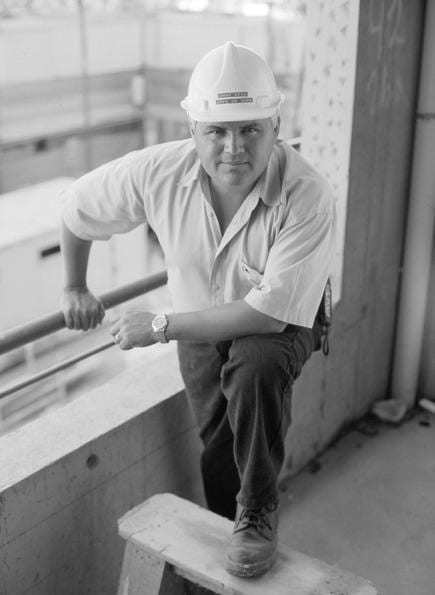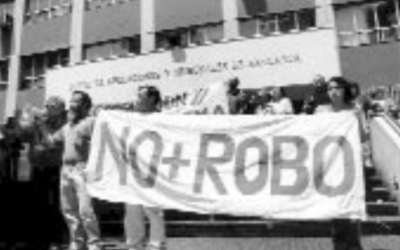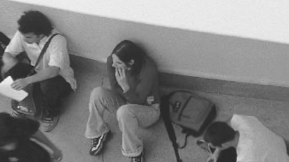Chile Today
Two Viewpoints

A construction foreman partici- pates in government program “Chile Capacita.” Photo by Alejandro Barruel
Two divergent views seek to define Chile today. One tends to be self-complacent, optimistic and officialist. The other is more marginal, skeptical and sour.
The first of these visions builds on the premise that Chileans have suffered too much and too long. A different country is what they deserve; one no longer torn by dissension nor economically destitute, ruled by civilians, but as unlike as possible from the radical Allende regime which brought us to the brink of civil war. In short, a consumer market economy, open to new international opportunities, bound to economic growth and orthodox fiscal policies, respected by international financial agencies and foreign investors, but, allegedly, without forgetting the poor and the less competitive. In other words, it is a line of thinking that envisions a government not willing to waiver its right to raise taxes when it finds it convenient nor wanting to relinquish the control of copper and other strategic industries in order to maintain macro-economic balances.
This position more or less coincides with what the military tried to accomplish. Paradoxically, though, this time, former opponents—watched over firmly by the armed forces as constitutional “guarantors”—are in charge of the implementation of these goals. As if this were not enough oversight, a number of additional institutional mechanisms require the consensual agreement of the powerful right-wing opposition. This is a scheme hard to swallow—but not without its benefits. After all, it has given an electoral advantage to three center-left Concertación governments, in power since 1990 after Pinochet lost the 1988 plebiscite that sought to perpetuate his regime yet another eight years. Former socialist-minded politicians have been able to leave behind their past reputation as poor administrators and radical subversives to the point that no member of the establishment would at present care to disdain them. And, whatever their past ideology, the fact that they can control a still potent state—if not wealthier now, at least more businesslike—has given them the chance to carry out what they have always aimed to achieve, to engineer revolutionary change from above, nowadays via the market. That they may be the envy of Latin America, not unlike when they were being proclaimed revolutionary models, has given them a further cause to be boastful. Enough to pass over the bad years, and any remorse for what they are now defending. History, for them, today as well as thirty years ago, is not so much dead as surmountable.
The other position holds that the Concertación governments have compromised too much. They were elected to reform the Constitution and the neoliberal system, put an end to dictatorship, and bring about some justice in compensation for the atrocious human rights violations. Since none of these objectives has been fully met, the Concertación appears to be a mere machination to perpetuate the military legacy, while the Right awaits its comeback, gaining more at this stage by being in the opposition than in La Moneda. Consequently, this critique questions the moral motives of those who are now in power, seeing them as a self-serving coterie bound to ideological betrayal, accommodation and personal ambition. Needless to say, people holding this view are seldom admitted to political circles. They are labelled nostalgic, bitter, unrealistic, premodern, elitist and too quarrelsome. Without any effective organization behind them, nor any concrete alternative proposal, these Chileans are often viewed as a chorus of lamentation that should be left alone, marginalized and generally unheeded.
Fortunately or not, this group cannot be dismissed so easily. What they have to say periodically, generates debate. In 1997 and 1998, a number of bestselling publications diagnosed a growing climate of frustration. They could not have been more timely: in 1997, the Concertación lost popular support in the parliamentary elections. Almost four million Chileans (40%) either did not register, abstained, annulled their vote or left it blank.
The economy also accounts for this increasing malaise. Annual economic growth in 1998-2002 was 2.4%, compared to 7.7% between 1990 and 1997. If in the earlier period, employment rose 2.4% annually, in these last years, the average increase in new jobs has been a poor 0.4%. If the number of Chileans below poverty level descended abruptly from 5 million in 1990, the number has remained around 3.1 million since 1998 (21%). Other variables point to a more complex picture. According to the 2002 census, 87% of households own a color television; one out of five families owns a computer; one out of ten is connected to Internet; 51% has at least one cell-phone, and three out of four families are homeowners. However, the 2002 United Nations Development Programme (UNDP) report still posed anguished questions such as: “We Chileans: Who are we? What is happening to us? Where are we going?” Answers were even more sulky; at least 52% felt they were “loosers”, 54% expressed doubts with respect to the economy, and 43% said that their incomes barely allowed them to live decently. No wonder, the 1998 UNDP report focussed on what it called “the paradoxes of modernization”.
A number of recent events have damaged public confidence in institutions. Pinochet´s London detention and his subsequent acquittal by Chilean courts, as well as a streak of scandals involving the illegal appropriation of public monies by high government officials to finance their political parties, may explain why only 50% of people polled in 2002 answer that democracy is the best political system; 30% think “it does not matter”; only 23% have confidence on the judiciary; and a mere 12% trust political parties. In 2002-2003, two former ministers were formally accused. One of them was Lagos´ succesor in the Ministry of Public Works, the other was a close friend and political confidante. In addition, an undersecretary and half a dozen Concertación congressmen were also involved and are under present investigation. In this, the worst crisis in the past decade, the President of the Central Bank and the Vice President of Corfo, Lagos´s son-in-law, and high functionaries of the Universidad de Chile had to step down from their posts. At the beginning of 2003 there was serious talk that Lagos might not end his term. All came to nothing, though, after Pablo Longueira, the leader of the Unión Democrática Independiente (UDI), the main political party in Chile, linked to Pinochet supporters, literally saved the President and agreed to reorganize the state.
In addition to this panorama of mistrust and corruption, disturbing statistics show that 61% of crimes go unreported; 40% of Chileans show some form of mental disorder; half of Chilean women suffer family violence; and 19,000 children are mistreated each year. Data on education is contradictory. University attendance may have increased from 120,000 twenty years ago, to approximately 500,000 at present. However, one of the 70 new private universities can invest $ 8 million in a brand new library—and have only 40,000 volumes in its shelves; tax breaks explain high expenditures in infrastructure, while effective research commitment is still to be seen. Chile systematically ranks well below in almost all international tests, and reading levels could not be poorer; nevertheless the Minister of Education insists in making Chile a bilingual English-speaking country. Supposedly, this ought to make us more “globalized”. Let us hope so; the main daily devotes 14 pages to “social life” against 4 dealing with international news. In the last years of dictatorship we had a more progressive and critical press than today. According to Human Rights Watch, Chile ranks immediately below Cuba as the worst record in freedom of speech in all of Latin America. In terms of personal freedom, it is not doing that well either; there is still no divorce law.
How is it that a country can be so conservative and yet so apparently modern? The obvious explanation is that it is meant to work that way and has been doing so ever since the Pinochet years. Whoever rules Chile has to be acrobatic. Witness the last bombshell, involving rightwing opposition politicians, which has kept us daily in sordid shock these past five months. A conservative Renovación Nacional congresswoman informs the country that two UDI senators were regular participants in pederastic orgies. This bickering amongst rightwing allies takes place when Lagos´ government is barely surviving and UDI Joaquín Lavín, the 2000 election runner-up, seemed unbeatable as potential President in 2006. Longueira fights back and denounces a conspiracy, but tells us that he has received word of this, while praying, “from beyond”. In the meantime, the judge in charge of the investigation has to resign because he was caught confessing that he had attended a gay brothel, filmed by a secret camera supplied by one of the television networks. This “reality show” takes place when gay characters are becoming increasingly visible in the leading popular soap operas. Congress immediately passes restrictive legislation on press coverage, Chile´s most credible anchorman is taken to jail, and the age of sexual consent is steeply raised. Yet it is well-known that more than half of the population is born out of wedlock, and adolescent pregnancies are commonplace. At press time, Longueira´s contentions that this has been a communication ploy is making slightly more sense, Lagos and the Concertación feel partially relieved and are making plans for a fourth term.
What are we to make of all this? My guess is that Chile is an unstable society undergoing rapid change. It obliquely deals with its past traumas, all of which center on violence, in the absence of a strong consensual agreement that would permit us to deal with them frankly on an institutional level. Consensus politics is built into the Constitution. However, in many cases, it simply serves to maintain fragile equilibria amongst powerful sectors. Chile is not an open society and has a long way to go before it can meet the standards of a demanding modern world. It may be progressive economically, but only to a point. Poverty and unequal distribution of wealth are pressing dilemmas that neither the military nor the Concertación have solved adequately. People in power are not as transparent as they like to make us believe; unfortunately, we have little, except scandalmongering, to detect this flagrant contradiction.
Moreover, there are prospective conflicts to be dealt with. Our alliance with the U.S. and the recent demand of Bolivia for multilateral negotiations concerning sea access are headaches we might be facing in the future. The argument that we are being called to account because we are doing things right and are living well in a “bad neighborhood” is simply sham. Ethnic reivindications are another of these destabilizing factors we should be considering; fifteen years ago, most Chileans’ only contact with the Mapuche was in history textbooks.
Finally, if we have learned anything during these past years, it is that Chilean society resists any clear-cut definitions. This situation is not unlike what happened, back in the early 1970’s, when it turned out that we were not the Latin American exception that confirmed the rule, nor as institutionally bound as everyone wanted to think. If so, in the near future, Chile will be a far more surprising place than anyone in or out of power, self-assured or not, might be guessing at this present time.
Spring 2004, Volume III, Number 3
Alfredo Jocelyn-Holt, a Chilean historian, is Director of Universidad Diego Portales´ Instituto de Estudios Humanísticos and teaches at the Universidad de Chile. With a B.A. and M.A. in Humanistic Studies from The Johns Hopkins University, a law degree from the Universidad de Chile, and a doctorate from Oxford University, he is the author of several works, amongst them El Chile Perplejo: Del avanzar sin transar al transar sin parar (1998), Historia del siglo XX chileno (2001), and is presently working on a five-volume Historia General de Chile, the second volume of which will be coming out this year.
Related Articles
Poverty or Potential?
Teresa stops me three blocks from Nueva Imperial’s main plaza on a quiet Wednesday morning, eager to chat. She is wearing a light blue sweater and a matching blue headband glowing slightly against her dark black hair.
Editor’s Letter: Chile
I was hesitant to do an issue on Chile when I had other topics broader and richer in content. Although in a way Chile seems like an obvious choice because of the DRCLAS Regional office there, I felt there were other priorities in terms of substance.
Three Students, Three Experiences
I was extremely impressed with how successful the Chilean health system has been in improving the health of its citizens despite its limited resources. Its success, however, in many…




